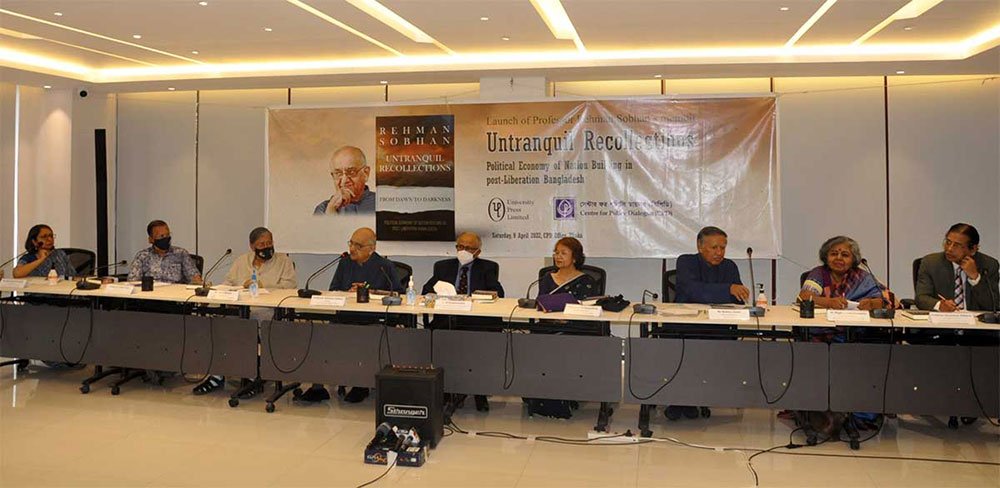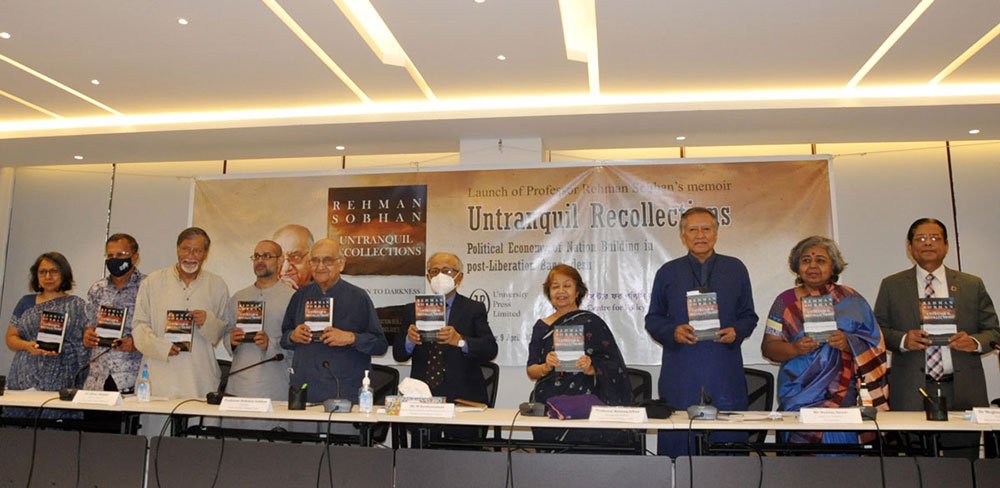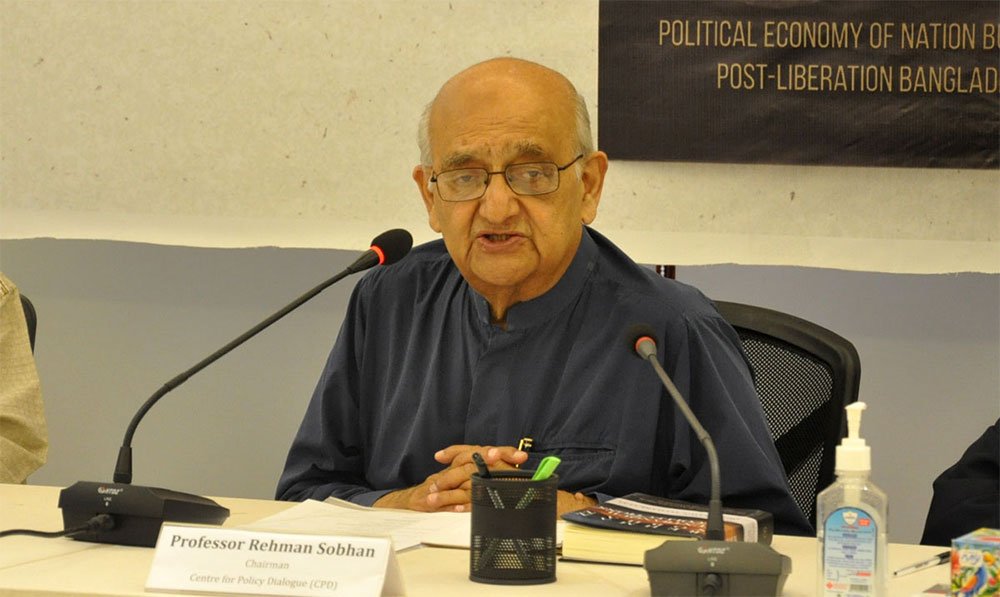
Centre for Policy Dialogue (CPD) and The University Press Limited (UPL) jointly organised an event on the occasion of the launch of Professor Rehman Sobhan’s memoir titled “Untranquil Recollections: Political Economy of Nation Building in Post-Liberation Bangladesh”, on 9 April 2022. The volume has been published by UPL.
“Untranquil Recollections: Political Economy of Nation Building in Post-Liberation Bangladesh” is the second volume in the Untranquil Recollections series. The author mentions in the Preface that this volume is “a memoir of an activist who was himself a part of the historical process”. This volume captures the unique challenges facing Bangladesh in the years immediately after liberation when Bangabandhu on his return assumed the responsibility as the head of the government. Professor Rehman Sobhan sheds light on many challenges that the war-devastated country was confronted with while establishing new institutions from the ground up. The newly set up Planning Commission of Bangladesh, of which Professor Sobhan was an integral part and a key member, was vested with the responsibilities of providing guidelines to Bangabandhu in laying the foundations of a socialist economy in Bangladesh. The book provides a frame narrative as to how the Planning Commission dealt with policy issues, how the political economy played the cut, how the first Five-Year Plan was formulated, and how foreign relationships were built, till the time of the tragedy of 15 August 1975.
The book is divided in 16 chapters featuring various phases of Professor Sobhan’s life till 1975. The chapters are: (i) Introduction; (ii) First Days in Liberated Bangladesh; (iii) My First Exposure to Government; (iv) The Political Leadership of the Planning Commission; (v) The Workings of the Planning Commission; (vi) Discovering the Political Economy of Policymaking; (vii) The Challenge of Delivering the Five-Year Plan; (viii) Making the State Effective; (ix) The Challenge of Improving the Performance of the Nationalised Sector; (x) Outcomes from Our Efforts to Improve the Performance of the Nationalised Sector; (xi) My Return to Aid Diplomacy; (xii) Laying the Foundations of Indo-Bangladesh Economic Relations; (xiii) Re-entry into Civilian Life; (xiv) The Gathering Storm; (xv) Darkness at Noon; The End of an Era; and (xvi) Recollections in Tranquillity.

Professor Rounaq Jahan, Distinguished Fellow, CPD, moderated the launching event. She remarked that the book by Professor Sobhan is a significant historical document that merits serious attention. The period during 1972–1975 in Bangladesh needs to be researched thoroughly but there are not enough documents dealing with the period. “Untranquil Recollections” can be a primary source for relevant researchers. She added that the book is an objective and non-judgemental assessment of the post-liberation period, blending historical chronicles with a wonderful storytelling approach.
In her welcome remarks, Ms Mahrukh Mohiuddin, Managing Director, UPL, said that the volume with its subtitle “From Dawn to Darkness” contains many unknown facts as seen by someone who was an important player in policymaking as member of the first Planning Commission.

Professor Rehman Sobhan, the author of the book and founding Chairman of CPD, said that the real challenge immediately after independence was to put in place the building blocks where there was no functioning administration or economy in existence. The book sheds light on those challenges facing war-devastated Bangladesh such as formulating a foreign policy and designing economic policy, attracting foreign aid, negotiating aid, and setting up institutions of governance from scratch. To add to these challenges, Bangladesh government had to deal with two consecutive famines. Professor Sobhan remarked that the key challenge was putting policies into practices. He recalled some of his practical experiences involving obstacles that he and the Planning Commission faced, and how Bangabandhu guided them and provided them with political support, and also how some in the bureaucracy often put roadblocks on the way. He stated that Bangabandhu was the architect of the policies in the newly emerged country, and they tried to implement his directives. Professor Sobhan also said, new generation needs to understand what Bangladesh was like back then and what the philosophies and values were in that period. He said that he tried to capture the reality as objectively as possible in his book.
Dr Kamal Hossain, Former Law and Foreign Minister, joined the event as the Special Guest. Congratulating Professor Rehman Sobhan on the occasion, Dr Kamal Hossain said that the memoir does not limit itself to economic dimensions only, rather it also reflects on the political challenges in building a war-ravaged economy. This book is a synthesis of politics and economics, and portrays invaluable contributions of the author in the post-independence period.
Mr M Syeduzzaman, Former Finance Minister and Planning Secretary and Member, CPD Board of Trustees, chaired the event. He shared some of his experiences of working with Professor Rehman Sobhan. He recalled how they have worked together in the government, he as Secretary to the Planning Commission, and also beyond. He considers the book launching as an occasion to relay the thoughts and knowledge of an extraordinary scholar and quintessential political economist to the younger generation of Bangladesh.
What this book offers to its readers can be demonstrated through multiple lenses—as a document of history, as a lesson in political economy, and as a source of economic analysis, said Professor Mustafizur Rahman, Distinguished Fellow, CPD. The book is much relevant to the present day and can excite interest in current issues that pertain to young generation. One can learn from the volume that, between policymaking and policy implementation, there needs to be policy engagement. And that the tension between professionals, politicians, and bureaucrats is something which is important to keep in mind.
Professor Abdul Bayes, Former Vice Chancellor and Professor, Department of Economics, Jahangirnagar University, and Former Director, Research and Evaluation Division, BRAC, felt that the 16 chapters in this volume are like 16 eloquent stories, that transmit a wealth of knowledge, wisdom and insights beneficial for both old and new generations.
Dr Ahrar Ahmad, Director General of Gyantapas Abdur Razzaq Bidyapeeth, remarked that the present volume is a brave reflection of many critical and controversial issues making the chronicle a “risk-prone” enterprise. The narratives come in the author’s words and “vulnerable to the narrator’s agenda”. It is Professor Sobhan’s credit that he pulls it off in style. “This book must not only be read, this book must be studied,” said Dr Ahrar.
Professor Habibul Haque Khondker, Professor, Department of Humanities and Social Sciences, Zayed University, shared how Bangladesh moved ahead during its early years despite the difficulties and very limited policy options and policy choices. He acknowledged the strong role played by Planning Commission led by Bangabandhu’s vision. He noted that India at that time was the only country which was ready to come up with significant support for Bangladesh.
Dr Meghna Guhathakurta, Executive Director, Research Initiatives, Bangladesh (RIB), said that this book perfectly depicts the uncertainties of the post-independence period. “Each page gripped me so much that I could not skip a page of the book,” she said. Issues like the portrayal of institutionalisation versus political dynamics has been documented in this volume which has always been extremely important and pertinent in the context of Bangladesh’s history, she noted.
Mr Mahfuz Anam, Editor and Publisher, The Daily Star focused on a number of issues covered by the author in the book. He talked about the tension between political leadership and academic leadership, and the difference in understanding between the political concept of socialism and Planning Commission’s concept of socialism. He felt that the rich content of this volume will prove to be not only a work of essential scholarship but also a document to which researchers will come back again and again.
The event was followed by open-floor Q&A and discussion. Researchers, academics, authors, literary activists, civil society representatives, and media professionals attended the launching event, some physically, others virtually.


